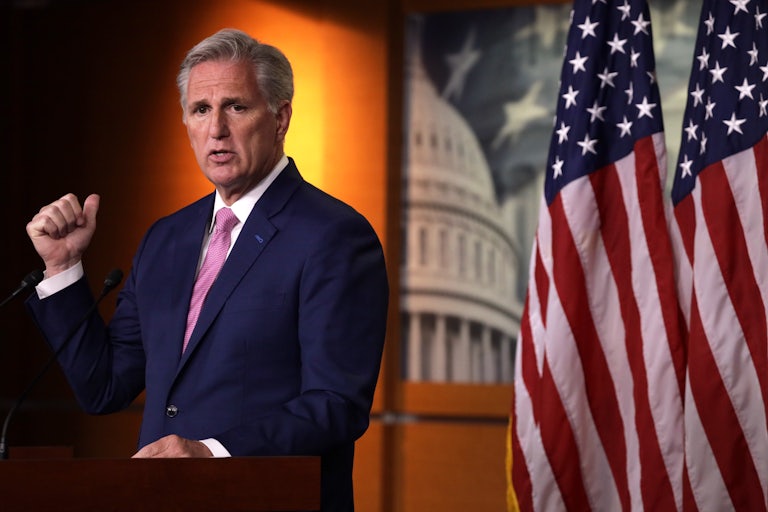Matt Gaetz Is More Outraged Over McCarthy in the Speaker’s Office Than He Was Over Rioters in the Capitol
Gaetz wants Kevin McCarthy to stop occupying the House speaker’s office. He didn’t care this much about the rioters occupying the Capitol on January 6.

Representative Matt Gaetz is livid that Kevin McCarthy has “occupied” the speaker of the House office—and he’s making a bigger deal about it than he did when rioters actually occupied the Capitol.
McCarthy has made no secret of his desire to be speaker, and he clearly thought he had the role on lock, going so far as to move his things into the speaker’s office Tuesday morning. But after three consecutive votes, not only did he lose every time, but he also lost votes as the session dragged on.
Gaetz, who has been staunchly opposed to a McCarthy speakership, demanded to know Tuesday night why McCarthy was still in the speaker’s office considering he had not yet won the gavel.
The Speaker of the House Office in the Capitol is currently being occupied by Kevin McCarthy.
— Rep. Matt Gaetz (@RepMattGaetz) January 4, 2023
Kevin McCarthy is not the Speaker of the House. He lost 3 consecutive votes today.
I’m demanding answers from the Architect of the Capitol. pic.twitter.com/AIZ8bFks6W
He was joined by Andy Biggs, who not only voted against McCarthy every time but also ran as a long-shot challenger in the first round.
Gaetz’s outrage seems particularly ironic when compared to his reaction the last time the Capitol was occupied: on January 6, 2021, when it was overrun by supporters of former President Donald Trump trying to stop Joe Biden’s election win from being certified.
Gaetz had already been involved in efforts to overturn the 2020 election results. A loyal Trump toady, he has repeatedly downplayed the January 6 riot, including insisting that the FBI was involved in the attack.
On the one-year anniversary of the insurrection, Gaetz referred to the rioters as “patriotic Americans … who had no intent of breaking the law and doing violence.”
“We’re ashamed of nothing,” he said on a podcast hosted by former Trump adviser and extremist Steve Bannon.
Gaetz’s animosity toward McCarthy actually stems in part from the latter’s response to January 6. McCarthy considered Gaetz to be one of the chief offenders during the riot, The New York Times reported.
McCarthy said Gaetz was acting recklessly, such as by attacking Republican leaders who opposed Trump on television. McCarthy’s number two, Republican Whip Steve Scalise, accused Gaetz of “potentially illegal” behavior.
At the time, Gaetz slammed both McCarthy and Scalise as “weak men.” And now he’s one of the main obstacles to McCarthy becoming speaker.








